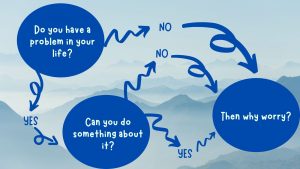
My cat is fearless. (Note: That’s not my cat in the picture, but I wouldn’t be surprised if she pulled a similar stunt). She slapped a dog 3x her size because he was getting a little too close for comfort, explored dark alleys, and couldn’t care less whether that crisp white shirt she lies down on belongs to you or the Queen of England.
How does she do it? How does she not worry about the consequences of her actions, or what will happen tomorrow?
I know I’m not the only person who stays awake at night worrying about things. Or who thinks that the kind of things I worry about rarely, if ever, cross the minds of other people. And you don’t need to tell me that worrying isn’t healthy – I know the research; I’ve conducted some of it myself.
Trust me, if there was a switch in my brain where I could shut off worry like I do my lamp, I’d have done it by now.
“I’m surprised you don’t have any white hair,” my hairdresser often muses.
“You know, my son is a lot like you. What’s wrong with you Cancers? It’s like you were born to worry.”
Ah, but it’s not so much an astrological issue as it is one of habit. So how does one stop? I’m in the process of coming up with a step-by-step method.
Now, this method isn’t meant to replace the benefits of therapy, to treat an anxiety or panic disorder, or to avoid recognizing a problem. It’s an in-the-moment, 5-minute therapy session to help me and you calm down and take a break from chronic worrying.
Here’s my process: I’ve set my worry level at 8.
Step 1
Remind myself that worrying about what could happen will not make it come true. (More on this later). I can totally imagine myself on my death bed 70 years from now (I plan to stick around for a while) regretting the time I wasted worrying.

New worry level: 7
Step 2
Blame my mother, who spent most of my childhood worrying about everything one could possibly worry about.
New worry level: 6 – I’m not one to blame others for any of my short-coming or misfortunes. Nope. I like to carry that burden all by myself. Woohoo for me.
Step 3
Remind myself about the dangerous side effects of chronic worrying, which include dizziness, dry mouth, fast heartbeat, headaches, difficulty concentrating, muscle tension, nervous energy, rapid breathing, immune suppression, digestive disorders, short-term memory loss, premature coronary artery disease, heart attack.
New worry level: 6 ½ – Geez, heart disease? Heart attack? How is that supposed to make me feel better? Next!
Step 4
Look at the illogicality of worry in a logical manner. This doesn’t require endless hours of deep introspection and analysis. I just follow the thought process below, starting with “Do you have a problem in your life?”

New worry level: 5 – I’m reminded of something Confucius said: “Life is really simple, but we insist on making it complicated.” The solution above may be utterly simplistic, but that’s where its power lies, because in its simplicity lies a truth. The problem is that most of us don’t use simple solutions; we don’t like simple. Think about it for a moment. Don’t we all become suspicious when a solution is too simple? It sounds too good to be true! We are so fascinated with complication and analysis that we purposely create challenges and obstacles for ourselves (well, I know I do). In that moment, however brief, when I recognize that life is so very simple, all I feel is absolute bliss.
Step 5
If the simplicity of Step 4 isn’t working, I try something more complex. I create a list of all the things that I am worrying about, and estimate the probability of it happening, translated into a percentage. It’s important to try to be as objective as possible, and realistically estimate how likely it is that a worry will come true. Here’s an example based on the most common worries that people have (and a few of my own):
- Losing my job in a time of economic uncertainty: 35%
- Whether I will find the right partner/Whether my partner is the right person: 60%
- Unexpected death of a loved: 50%
- Unexpected death of a beloved pet: 70%
- Unexpected and large financial expenses: 70%
- Being a victim of a crime: 30%
- Political strife and the consequences of an unstable government: 70%
New worry level: 4 – A lot of things we worry about are based in the future – the “what ifs.” It doesn’t necessarily mean that they will happen. Granted, some of these worries will come true (death of a pet), but that doesn’t mean that it will happen tomorrow, next week, or next month – and there’s no point in worrying about it until it happens. Worrying will not stop it from occurring, nor will it make me feel any better about it.
Here’s another way to look at worries that will make them seem less overwhelming. In his book Three Minute Therapy, Dr. Michael R. Edelstein explains that absurd worries and fears are a lot more common than we think. I mean, how often have you said to yourself, “I bet no one worries about the ridiculous things that I do.” (I said it to myself yesterday). Well, there’s a good chance that someone, somewhere, has! Here are some of the worries and fears expressed by Edelstein’s clients – on a very frequent basis:
- The fear of being on a high floor of a tall building because one side of the building might abruptly crumble, or you might suddenly feel an irresistible urge to jump through the window.
- The fear that one will be possessed by an unconquerable urge to do something outrageous and embarrassing in public (e.g. rushing the stage during a play).
- The fear that one will die while asleep. Someone may notice that his heartbeat slows down as he becomes drowsy, and he may then start worrying that it will stop altogether if he falls asleep.
Here are some stranger worries people have expressed to Dr. Edelstein:
- An elevator inspector was obsessed with the thought that he might suddenly decide to become a woman and have a sex-change operation – though he never had felt such a desire, and in his sexual preferences and behavior he was an entirely typical heterosexual male.
- A young music teacher was afraid to go into a public pool in a Midwestern city because there might be sharks there, which might eat him, or at the very least bite off one of his feet. He knew that it would be difficult to smuggle a live shark into such a pool; that if there were a shark there, he ought to be able to see it; and that any self-respecting shark would no doubt be so bothered by the chlorine it would not lie quietly in wait at the bottom of the pool. Nonetheless, he described himself as petrified by the thought that such a thing might happen, so that he had given up his twice-weekly swim.
“Demanding certainty in an uncertain universe leads, paradoxically, to concluding that unlikely dangers are virtually guaranteed to happen. And if you insist on absolute, one-hundred-percent security, you create emotional insecurity for yourself.”
Dr. Edelstein
Now you might be thinking that your worries and fears are much more realistic, if not probable. But here’s the thing: probable or not, they are all based in the fear of uncertainty, and a demand that the world provide you with absolutely certainty. And it’s just not going to happen. So what can you and I do? Let’s move to Step 6.
Step 6
Stop using “must” and “have to” type thoughts.
Here’s an example of a therapy session Dr. Edelstein conducted with a client named Tony, who had spent most of his life worrying about everything from making mistakes when he was playing Little League baseball to his current worry: losing his job.
“The root of your problem, Tony,” I suggested, “doesn’t lie in your Little League experiences, nor in your promotion at work, nor in your shaky financial situation should you lose your job. Rather, it lies in your demandingness – your ‘musts,’ your ‘have tos,’ your ‘got tos’ about your goals.”
I explained to Tony how “musty” thinking generates anxiety. I described the three types of demands: demands on oneself, demands on others, and demands on the universe.
“It’s clear to me what your major ‘musts’ are. Would you care to hazard a guess?”
“Let’s see, probably must number three: a demand on my situation – a demand on the universe. ‘My job MUST last forever’?”
“Exactly! And why MUST your job last forever?”
“Because if l lose my job, I’m royally screwed. I’ll never get such a good job. I’ve worked my way up. I’ll have to start all over again, at square one!”
Notice that Tony’s fear that he would lose his job was not a “silly fear” like the ones [mentioned earlier]. Employees at all levels, even dependable, hardworking employees, do sometimes lose their jobs. But when asked why this was terrible, Tony responded in exaggerated, melodramatic terms about consequences of losing his job.
“Let’s suppose that this is the case – although it’s unlikely – that you’d be starting at square one, even with your experience. We could certainly list fifteen or twenty disadvantages of your getting fired. But since everyone faces setbacks in life, why MUST you not?”
“When you put it that way, I admit that it wouldn’t be the end of the world if I lost my job. It would be unwelcome, but not a calamity…I could experience setbacks in my life, just like everyone else.”
To reinforce this, Tony and I made a list of the reason why his belief that his job MUST last forever is false. Here’s what he wrote:
1) Losing my job could give me just the push that I have been lacking to take a chance on my dream – starting my own business as a computer consultant.
2) If I lose my job, this would be a bad situation, but it would not make me a bad or worthless person.
3) Pressuring myself not to get fired will not help me keep my job. Moreover, it could turn into a self-fulfilling prophecy: the more I demand this, the more stressed and distracted I get, and the worse I perform.
The list Tony created during Dr. Edelstein’s session had 18 reasons in total, but I just wanted to provide a few examples. Whether probable or far-fetched, my worries are all based in a fear that life is not a certainty – that I need guarantees in order to survive. And the fact is, while there are no guarantee that my worries will not come true, there are also no guarantee that they will.
New worry level: 2 – I don’t need to push myself to reach a perfect 0.
Insightfully yours,
Queen D


tobechi74
This is life.we learn from all animals.well said indeeed
Cameron N. James
Reblogged this on cameronnjames and commented: Couldn't have said it better myself.
Queen D
Thanks Cameron. And thanks for the reblog :)